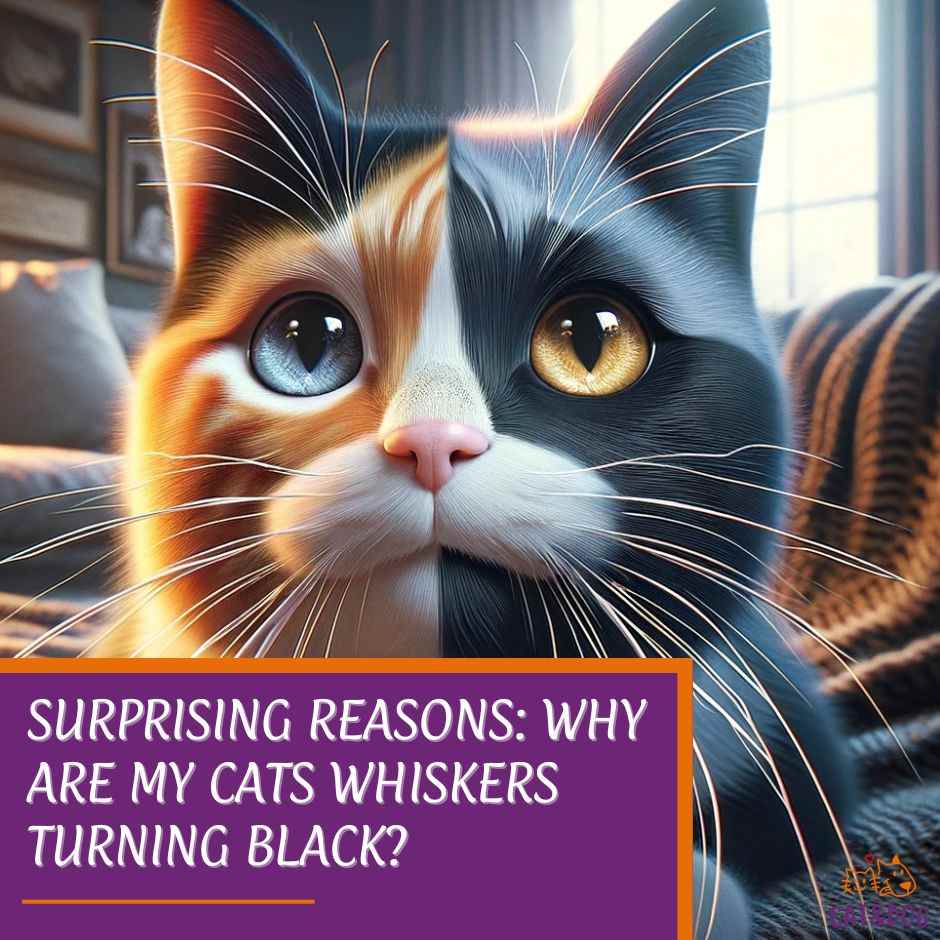“Why are my cats whiskers turning black?”
It’s not just you being observant; those mysterious black whiskers can sometimes be a source of fascination for cat owners.
Whiskers can change color for a few reasons, including genetics and age. While a sudden change in whisker color might raise an eyebrow, it’s usually nothing to worry about.
Whiskers are not just there for cuteness; they are packed with nerves and are a vital sensory tool that helps your feline navigate their surroundings. (1)
They can even give you a hint about how your cat is feeling emotionally! The whiskers on your cat’s body aid in its balance and gait, along with its tail.
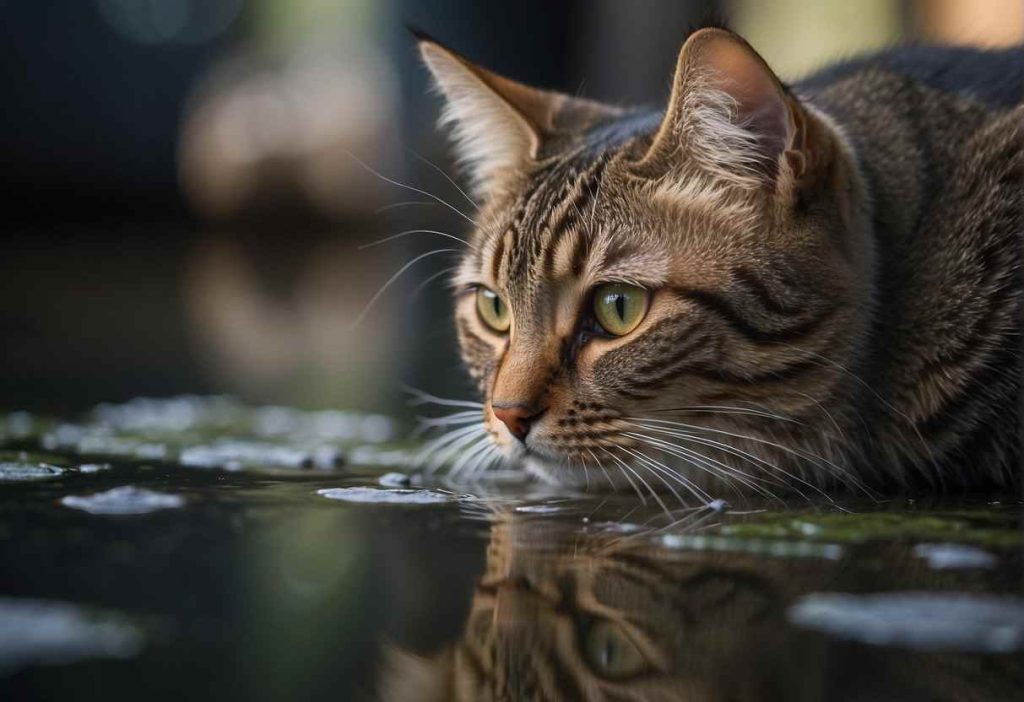
However, if you notice other symptoms accompanying the color change, like lethargy or a change in appetite, it might be worth a chat with your vet to ensure your pet’s health and well-being.
Remember, whiskers are as much a part of your cat’s health and well-being as their fur or claws, so it’s natural to want to keep an eye on any changes.
If you notice any unusual changes in your pet’s whiskers, it’s important to consult a vet to ensure your pet’s health and well-being. (2)
It’s always better to err on the side of caution when it comes to your pet’s health, and addressing any changes in their whiskers can help catch potential health issues early on.
Keep your pet’s health a top priority by staying vigilant and addressing any changes in their whiskers.
Key Takeaways
- Whiskers serve as an essential sensory apparatus for cats, aiding in navigation and emotional expression. (3)
- A change in whisker color often occurs naturally with aging but can sometimes indicate health issues.
- If whisker color change is accompanied by behavioral or physical symptoms, consulting a veterinarian is recommended.
Why Are My Cats Whiskers Turning Black: Health Implications
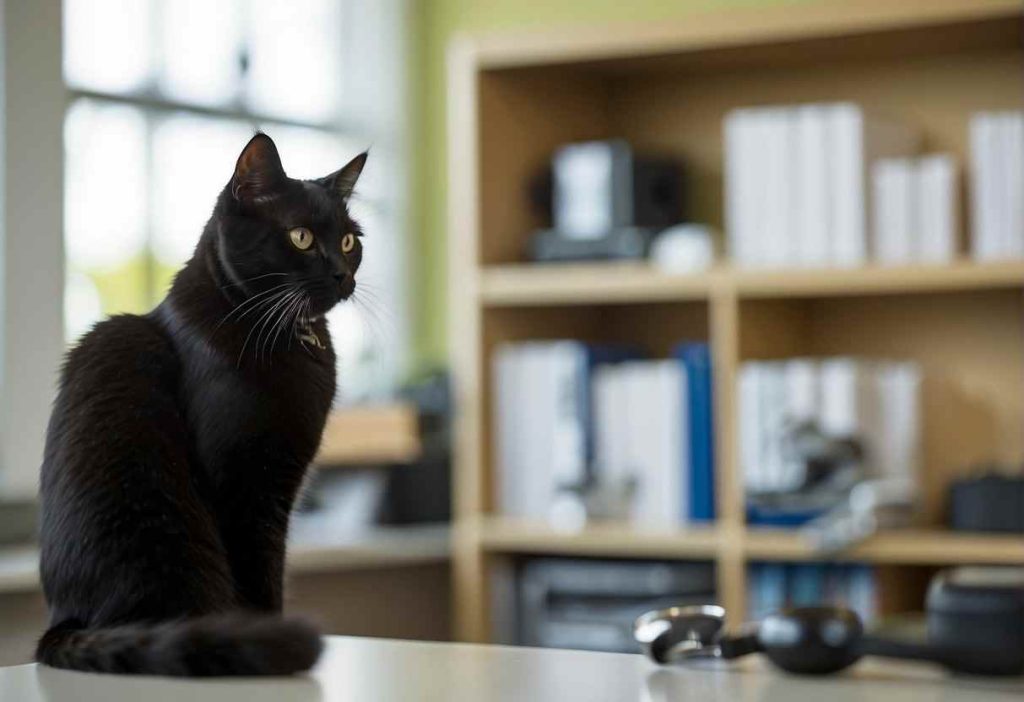
Ever noticed your cat’s whiskers shifting shades? It’s like they have a mood ring for whiskers, but instead of colors popping up with emotions, it’s a natural or health-related change at play.
So, when should you go from curious to concerned?
If black whiskers are just a new fashion statement as your cat ages or a quirky trait etched in their genes, it’s all cool. Nothing screams ‘unique’ like a personal touch of black whiskers, right?
But—yes, there’s a ‘but’—if this trend comes out of the blue, it might be whispering “vet time!”
Signs it’s more than just a natural dye job:
- Rapid color change: Whiskers doing a quick-change routine warrants attention.
- Accompanied symptoms: If black whiskers bring friends like skin irritation or changes in feeding habits, it’s worth a chat with the vet.
When to make the vet your next plan:
- Whiskers turn dark alongside a drop in the purr-o-meter (mood).
- Experience tells us a healthy diet and radar-sharp whiskers go paw-in-paw.
Now, let’s dive into some specific health whispers:
- Nutritional issues: Poor diet can reflect in coat and whisker health.
- Skin conditions: A whisker dipped in black might be due to skin-deep stories, like hyperpigmentation.
No need to transform into Detective Whiskers just yet. Keep an eye out for these clues, and remember, a quick vet run could give you peace of mind and keep your feline friend purring with health.
Sometimes, it’s just a little extra pigment saying hello, and other times, it might warrant a health check-up.
Genetic and Environmental Influences
Let’s unpack why your cat’s bewhiskered face might be sporting some new black strands. 🐾
The Role of Genetics in Whisker Color
In the cat world, genetics are the backstage crew working the magic on whisker color.
Think of genes as a personal stylist dictating whether your kitty sports the classic black, ginger, or even an ombre effect in their whiskers.
Some cat breeds, like the Bombay cats, are born to strut with black whiskers as a part of their genetic outfit. However, it’s not just black cats that can have black whiskers.
The color of a cat’s whiskers is largely determined by its genes, not just its fur color. Hence, even an orange cat or a white cat might be born with black whiskers.
Here’s a quick peek at the crucial role of genetics in determining whisker color, as they not only determine fur color but also play a significant role in whisker color changes over time.
Just as genetics determine your cat’s fur color, they also play a crucial role in determining the color of the whiskers.
For example, Siamese cats are known for their unique coat pattern and blue eyes, but they can also have dark whiskers due to the presence of the same gene that affects their fur color.
- Breed Predispositions: Certain breeds are naturally whiskered in hues of black due to a higher production of eumelanin, the dark pigment.
- Family Tree Influence: Just like your own hair color, your cat’s ancestors pass down whisker color traits.
Environmental Factors Affecting Whisker Color
Sunbathing and adventure aren’t just for fun—these activities can tint those tactile tresses too.
- Sun Exposure: Just as your hair might go a shade lighter in the summer, kitties’ whiskers can darken.
- Pollutants: Urban wanderers may get an extra sooty shade on their sensory spears.
- Grooming Habits: Cats are fastidious groomers, but the things they encounter can rub off on their whiskers.
So, if you’re admiring your cat’s silhouette against the window and spot some darkening whiskers, consider their genetic wardrobe and the outdoor escapades they’ve been up to.
Remember, this color shift is typically just a part of their charm—no more worrying than if you find a new freckle on your nose.
Exploring Whisker Color Variations
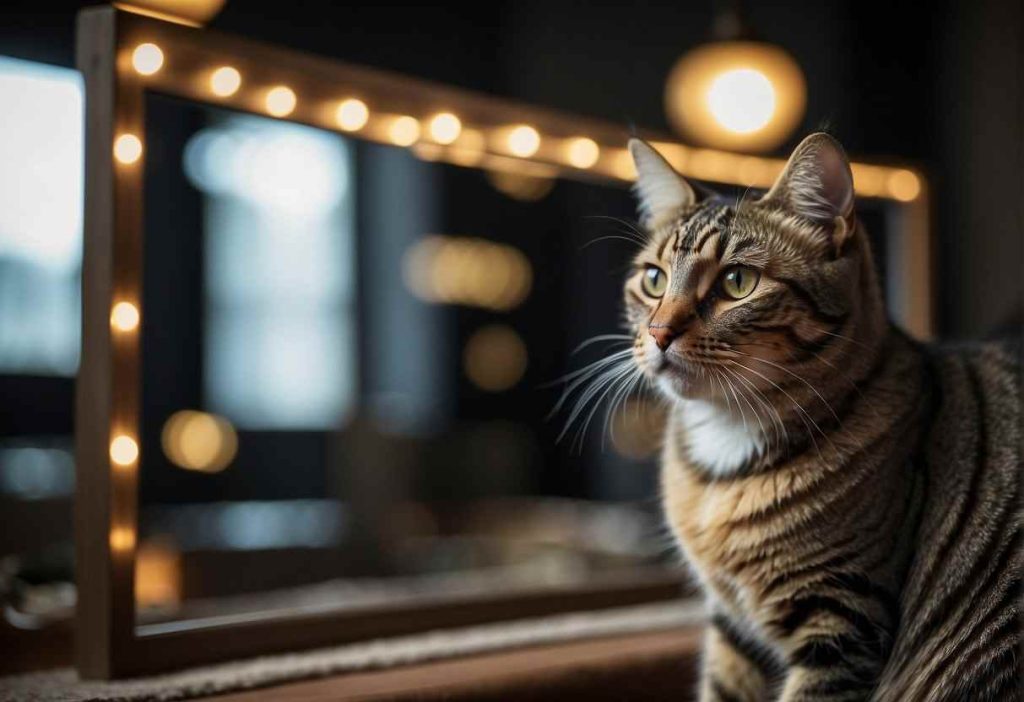
Let’s break down what those color changes might mean, without getting too whisked away!
Normal Whisker Colors: Cats typically sport white whiskers, but did you know this little detail is all down to genetics? It’s totally normal for kitties to have black or even a mixture of black and white whiskers.
- Kittens: Often born with pure white whiskers.
- Adult Cats: Whiskers can darken with age.
Age-Related Changes: Like us, cats show signs of aging. Whiskers turning black over time is just like you spotting that first grey hair, minus the existential crisis! (4)
Factors influencing whisker color:
- Genetics: Just like eye color, whisker pigmentation is inherited.
- Aging: Those whiskers may darken as your cat grows older – it’s normal!
Concerned about your cat’s whisker color? Generally, it’s nothing to fret about, but it’s good practice to keep an eye on your fluffy companion’s overall health, not just their stylish whiskers.
Remember, no two cats are the same, and that extends to their chic set of whiskers.
So next time you’re up close, take a moment to admire the unique pattern and functionality your cat rocks – they’re quite the trendsetter!
Common Myths and Misconceptions About Whiskers Colour

Let’s shine some light on this whisker phenomenon and clear up a few tall tales!
Myth 1: Black Whiskers Indicate Poor Health
Not true! While it’s easy to think a change in whisker color might signal a health issue, it’s generally not the case. Your cat is likely as spry and healthy as ever.
- Fact: Whisker color can change naturally with age or due to genetics.
Myth 2: A Single Black Whisker Spells Trouble
Caught sight of one rogue black whisker amid a sea of white? Fear not!
- Fact: It’s common for cats to have one or two whiskers that differ in color, just like the occasional grey hair in humans.
Myth 3: Black Whiskers Mean Hormonal Imbalances
While hormones can affect coat color, a few black whiskers aren’t a definitive sign of trouble.
- Fact: Melanin, which determines hair color, can cause whiskers to appear darker.
Myth 4: Cats with Black Whiskers Can’t Be Trained
A peculiar myth to say the least!
- Fact: Whisker color has no bearing on a cat’s ability to learn or perform tricks.
So, next time you spy a dark whisker on your cat’s muzzle, remember it’s just another quirk in the wonderful world of cats.
No need for alarm – black cat whiskers aren’t whispers of the arcane but rather ordinary parts of the feline charm. Keep this in mind, and you’ll find the truth is much simpler (and less spooky) than myth would have it!
Now, go give your mysteriously whiskered friend a treat; they deserve it for being such a great conversation starter and a natural process of feline aging at approximately 1 or 2 months of age.
Practical Advice for Cat Owners

Caring for Your Cat’s Whiskers
Hey there, cat parents! Noticed some intriguing color shifts in your feline’s whiskers lately? Turns out, a little ‘salt and pepper’ look can be quite the trend in the whisker world.
Maintaining those delicate sensory tools doesn’t require a salon visit—just some good ol’ loving care.
Make sure to gently brush their face with a soft grooming tool, steering clear of fierce combing because whiskers are sensory antennas that need TLC, not roughhousing.
Grooming Tips and Whisker Maintenance
Keep an eye out for signs of damage or breakage. No need to panic over a rogue black whisker; it’s their charm, right?
Just make sure your furball isn’t getting into too many whisker wars or cozying up to potentially harmful substances.
Diet and Environmental Considerations for Healthy Whiskers
We are what we eat, and the same goes for cats! A balanced diet enriched with necessary vitamins and minerals will do wonders for their coat and whiskers.
Remember, a stress-free home equals happy, healthy whisker vibes.
When to Seek Veterinary Advice
- Notice more than just a color change, like excessive loss or brittle whiskers? Time for a vet check-up.
- Is your kitty’s behavior changing alongside those whiskers? Vet time, because those whiskers should be strutting their stuff, not causing distress.
Importance of Regular Health Check-Ups
- Schedule those wellness visits! Regular health check-ups can keep minor whisker woes from turning into feline dramas.
With these pointers, you’re all set to keep your cat’s whiskers—and mood—in tip-top shape. Remember, each whisker is a masterpiece, painting the world for your cat.
Let’s keep those whiskers as majestic as they are meant to be!
Personal Stories and Relatable Experiences
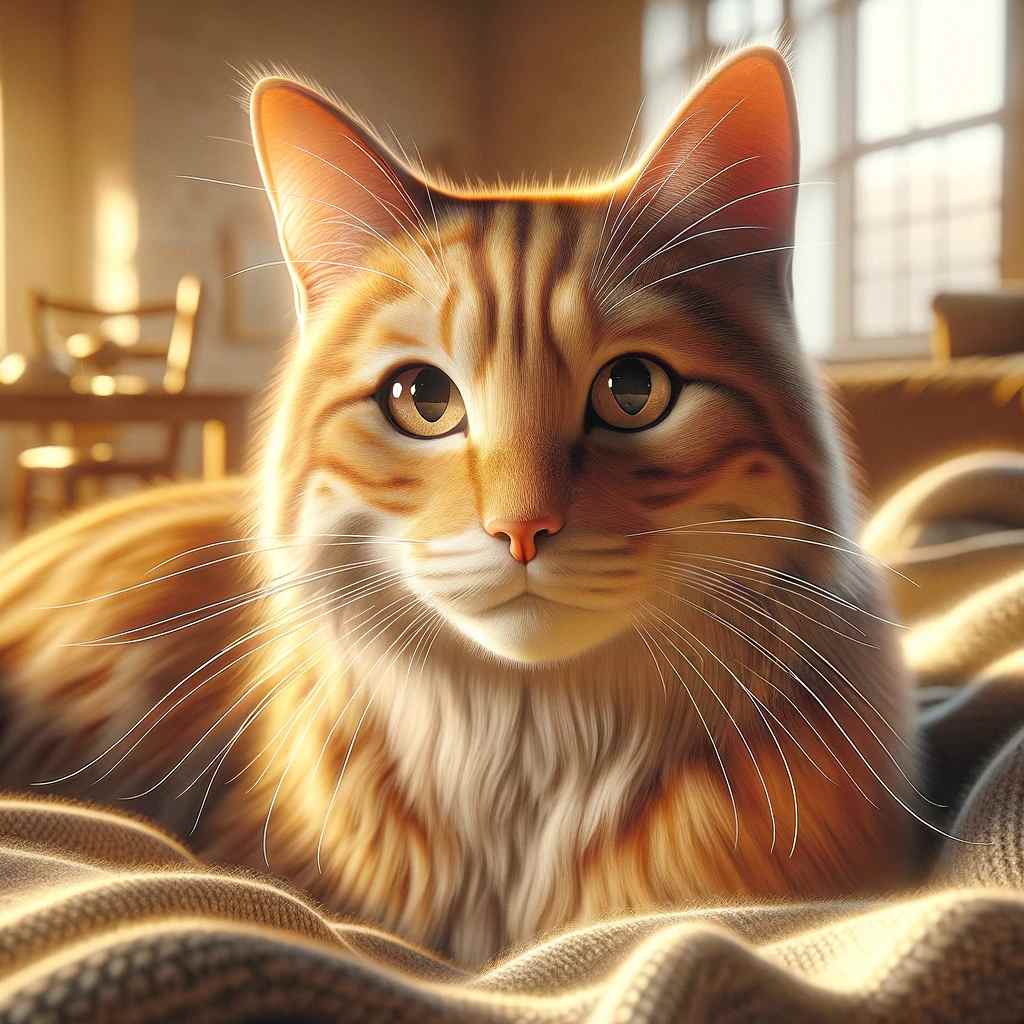
Sarah, a fellow cat owner, shared her surprise when she spotted black whiskers on her orange tabby.
At first, she thought her cat had gotten into her eyeliner!
Oddly enough, Mike encountered something similar when his white Persian’s pristine whiskers began to gain black tips.
After ensuring his cat hadn’t brushed against something sooty, Mike learned that such color shifts are often a normal sign of aging – not so different from us humans getting a few grays! (5)
Here are some reactions from cat enthusiasts:
- Kathy, who initially panicked, found a vet to confirm it was just a harmless pigment change.
- Tom used this as a conversation starter at his local cat café, discovering three other cat owners with similar stories.
Curious about their reactions? Look at how they addressed the changes:
| Owner’s Name | Initial Reaction | Action Taken | Outcome |
| Kathy | Panic | Consulted a vet | No worries! |
| Tom | Interest | Group discussion | Shared laughs |
Isn’t it fascinating how such small changes prompt a variety of responses? If your furball is showing similar signs, it might just be a natural part of their whisker-full life.
Take a cue from these anecdotes – you’re certainly in good company. Just imagine the tales your cat would tell if it could share its whisker adventures!
Quick Recap
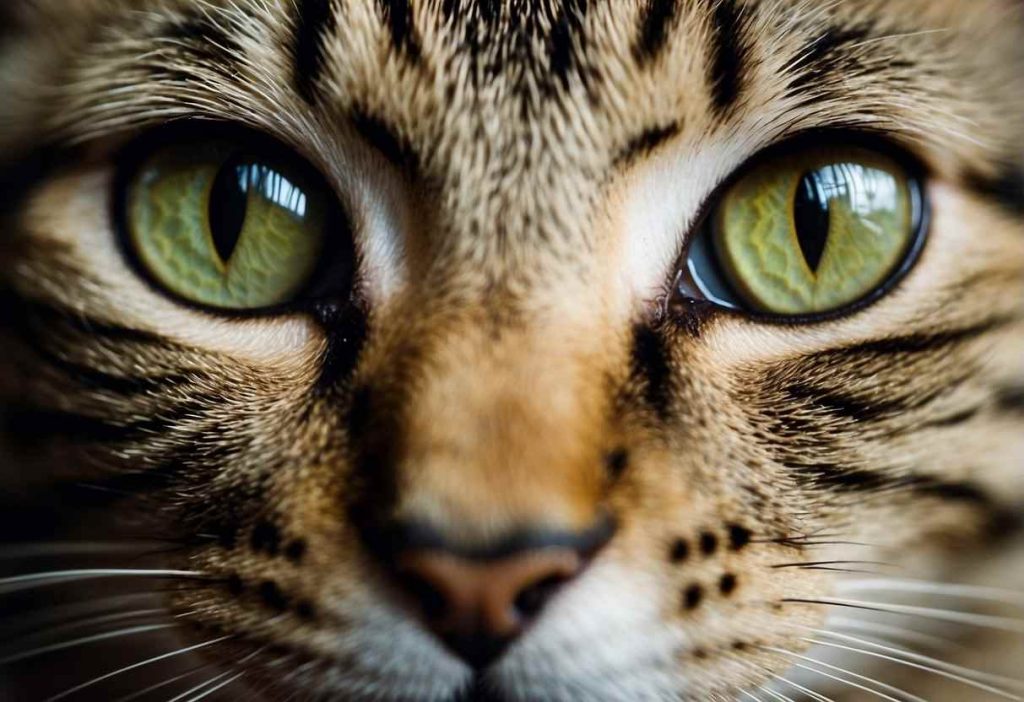
Have you noticed a mysterious change in your cat’s whisker color? Don’t worry, you aren’t alone. Your little friend’s whiskers turning black can be baffling, but it’s often part of the normal aging process.
Why might this happen? Let’s break it down:
- Genetics: Just like us, cats have genes that dictate their appearance, which includes the color of their whiskers. So, if your feline buddy has developed a solitary black whisker or all of them have turned dark, genes could be the artist behind this masterpiece.
- Aging: Time spares no one, and whiskers are no exception. If your cat’s getting on in years, a whisker color change could be like those graceful gray hairs we find in our own hair; it’s a natural part of the life cycle.
- Environmental Factors: The playground of life affects your kitty too. External conditions like sunlight exposure or contact with certain substances might result in a color change.
Are actions needed on your part? Generally, it’s a no-stress situation, but keep an eye on your furry friend’s overall health. Look beyond the whiskers – is your cat acting normally?
Eating and playing alright? If anything seems off, a vet visit is a smart move for a health check. (6)
And remember, this transformation is mostly a curiosity, not a crisis! Understanding your cat’s needs is part of the magical bond you share.
Embrace it and continue being the amazing, responsible pet owner your cat believes you to be – now that’s the spirit!
- Monitor Health
- Vet Check-ups (7)
- Understand & Bond
Frequently Asked Questions

Have you noticed your cat’s whiskers changing color and it’s making you curious? Whiskers are an essential part of a cat’s sensory navigation system, and changes in their color could be intriguing.
Let’s explore some of the questions you might have about this phenomenon.
Can a change in my cat’s whisker color indicate a health issue?
If your cat’s whiskers are turning black, it could be perfectly normal, but monitoring their overall health is crucial.
If this change is accompanied by other symptoms, it might warrant a trip to the vet.
What are the common reasons for a cat’s whiskers turning black?
It’s usually down to natural factors like genetics, aging, and sometimes, environmental influences. For most cats, it’s a normal part of their life cycle.
Is it normal for older cats to have black whiskers?
Yes, as cats age, pigment changes can cause whiskers to turn black, similar to how human hair turns gray. Consider it a sign of wisdom!
How do genetics influence the color of a cat’s whiskers?
Much like the coat color, the color of your cat’s whiskers is determined by genetics.
If your cat has black whiskers, it might just be a trait passed down from its feline ancestors.
Can environmental factors cause my cat’s whiskers to turn black?
Environmental factors such as smoke or dirt could potentially darken whiskers, but this is less common and easily resolved by cleaning them.
Should I be worried if my cat has one black whisker?
A lone black whisker is generally nothing to lose sleep over. Cats can have whiskers of varying colors, and a singular black whisker is often just a quirk.
How can I care for my cat’s whiskers?
Your cat’s whiskers are delicate sensors, so never trim them. The best care is simply to appreciate their purpose and let them be.
Remember, a change in your cat’s whiskers can be as normal as the changing of the seasons. If you’re ever unsure, your vet’s sage advice is just an appointment away!

